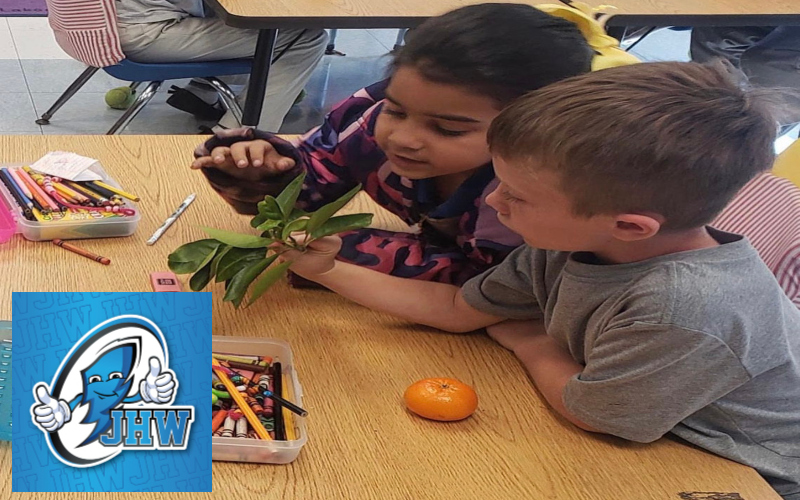PYP International Baccalaureate

The Learner Profile strives to build global citizens and life long learners, challenging us all to be the best that we can be in the home and school. As parents, using this language and terminology in the home can be a powerful way of reinforcing these ten personal attributes. Below are some ways of encouraging your child to continue their personal development using the Learner Profile.
Students who are COMMUNICATORS express their ideas by speaking, drawing and writing. They can also communicate using mathematical language and symbols. They also communicate in more than one language. They are good listeners as well. Being a good listener is an important part of communicating with others.
How can parents help to develop students who are Communicators at home?
- Encourage your child to stay in touch with relatives and friends who live in other place by writing letters, using the phone or sending email.
- When working on mathematics homework, encourage your child to explain his/her answer to you orally or by drawing a picture.
- Ask your child thought provoking questions and encourage them to discuss them with you. For example:
- What would you do if you were scared of someone at school?
- Is there anything you cannot buy with money?
- Should you get an allowance? Why or why not?
- Work with your child to improve his/her listening skills by modeling active listening.
Students who are RISK-TAKERS try new things and consider new ideas. They try to solve problems in a lot of ways. They have the bravery to tell people what they think is right.
How can parents help to develop students who are Risk-Takers at home?
- If your child is feeling uneasy about trying something, encourage them to attempt it and then reflect on both whether they liked the activity and how it felt to try something new.
- Your child
might want to set some short-term goals. Consider activities that make
him/her nervous. What are realistic goals for the week? Your child might
set a goal to:
- Offer an opinion in class
- Spend one recess with someone they might not usually play with
- Order something different from the lunch menu
- Try an activity they haven’t tried before
- Sometimes being a risk taker involves doing standing up for what one believes. Discuss famous people like Martin Luther King, Jr. Nelson Mandela, Rosa Parks, etc.
- Be careful to explain to your child the difference between being a risk-taker by trying new things and doing dangerous things.
Students who are PRINCIPLED have a sense of fairness and are honest with themselves and with others. They understand that sometimes there are rules and they follow them. They have an understanding of moral reasoning.
How can parents help to develop students who are Principled at home?
- Involve your child in deciding on the rules for a game or activity and then ensure that they stick to the ones that have been decided upon.
- Encourage your child to play games that involve teams. Discuss with your child the qualities of a team player. What sort of person would they want on their team?
- When your child wins a game insist that he or she is a well-mannered winner. They might thank their opponent or shake hands with them if it’s appropriate.
- When playing a game, don’t change the rules or let your child win. Being a gracious loser is just as important as being a good winner.
- Use the learner profile language when discussing home rules.
Students who are THINKERS work to solve problems independently. They can imagine many solutions to a question or challenge. Thinkers make good decisions and can predict the outcomes of their actions. They think creatively and critically.
How can parents help to develop students who are Thinkers at home?
- Encourage your child to try to think of solutions to problems independently.
- Pose different real-life problems and questions to your child:
- “I’m not sure how to arrange the glasses so they can all fit in the cupboard.”
- “I wonder how much the groceries in the cart will cost, how can we make an estimate?”
- “We need enough cookies for the 25 people in your class. What kind of change should we make to our recipe?”
- Ask your children questions when they are working on a problem:
- “Do you have any ideas about how we might begin?”
- “How can we do this differently?”
- “I had never thought of that. Tell me more about it.”
- “What other ways can we show that?”
- “Why do you think that?”
- “How did you figure that out?”
- Give your child an opportunity to think; reflection time is crucial for developing thinking skills.
An OPEN-MINDED student knows that all people are different. They listen to the points of view of others and consider many possibilities before making a decision. They celebrate the differences that make all people unique.
How can parents help to develop this Open-Minded trait at home?
- Encourage your child to try new things – new foods, new games and new activities.
- Expose your child to different festivals, celebrations and traditions and be sure to present them in a non-judgmental way.
- Encourage your child to really listen to others when they speak.
- Introduce literature about many different cultures into your home library. Be sure that it is appropriate and reflects the culture in an appropriate way.
Students who are BALANCED are healthy and are aware that eating properly and exercising is important in their lives. They understand that it is important to have a balance between the physical and mental aspects of their bodies. They spend time doing many different things. They balance work and play.
How can parents help to develop students who are well-balanced at home?
- Encourage your child to participate in a wide variety of structured activities.
- During less structured time, also be aware of the activities that your child is participating in. Too much time in front of the computer or television is not desirable. Generally active kids should take time for quiet reading or reflection; students who spend a lot of time drawing or reading, should be encouraged to also exercise and play.
- Discuss the food groups with your child. Spend a few minutes during a mealtime deciding if what your family is eating is balanced.
- Spend time as a parent or family doing many different things.
Students who are REFLECTIVE know what they are good at and what they’re not. They make changes where they can. They give thoughtful consideration to their own learning and consider their personal strengths and weaknesses in a constructive manner.
How can parents help to develop students who are Reflective at home?
- Spend some time reviewing their report card with them. They should have the opportunity to look at this document and consider it as well. Discuss it with them and truly consider their thoughts on their strengths and areas for improvement.
- Consider the goals that your child could set for the next term. Make a list not only of the goals, but of specific actions that can be taken to achieve these goals. You might want to list action that your child will take independently as well as action parents will take to support them. For example, if one of the goals your child sets for herself is to improve her writing, her action might be to keep a journal and write in it for at least 10 minutes each night. As a parent, you might decide that the two of you will participate in shared writing, for 30 minutes each week and produce a book of narratives together.
- Consider non-academic strengths and areas for improvement. Set goals and create an action list.
Students who are CARING want people around them to be happy and are sensitive to their needs. They think about the world and work to take care of their community and the environment. They remember to treat others how they themselves would like to be treated.
How can parents help to develop students who are Caring at home?
- Role model the caring behavior you would like to see in your child all the time. Your child has big eyes and ears and notices everything you do. Using kind words, helping people without being asked, being an active listener all show your child that you care about people. Even a simple thing, like holding a door for someone, shows your child that you are aware of others around you and want to help them.
- Think about how your family can get involved with community organizations.
- Reduce, Reuse, Recycle, Compost
- Smile.
- After
reading a book, spend some time considering how the people in the book
acted. Was someone in the book caring? All of the time or just some of
the time? Were all of the characters in the book caring or just some of
them? Some books to consider:
- Lily’s Purple Plastic Purse, Kevin Henkes
- The Giving Tree, Shel Silverstein
- Yertle the Turtle, Dr. Seuss
- The Grouchy Ladybug, Eric Carle
Students who are INQUIRERS are curious about the world. They can conduct research independently. They love learning and discovering new things and will carry this love of learning with them throughout life.
How can parents help to develop students who are Inquirers at home?
- Encourage areas of your child’s interest by visiting the library to borrow books that explore these topics.
- Develop an understanding of the Internet. Work with your son or daughter when the Internet is being used and try to instill the understanding that some Internet sites are not reputable.
- Model being an inquirer. Admit when you don’t know the answer to a problem or a question and seek out answers in front of your child.
Students who are KNOWLEDGEABLE have explored relevant and significant concepts and can remember what they have learned. They can draw on this knowledge and apply it in new situations.
How can parents help to develop students who are Knowledgeable at home?
- Encourage your child to read books at home that correspond with the topics being covered in school. In particular, books in their mother tongue will help your child make more meaningful, lasting connections to what is being taught in their classroom in English.
- Ask your child about what they are learning in school and engage them in conversations about it:
- “Why do you think that is an important thing to know about?”
- “Can you think of anything happening in the world today that might be similar to that aspect of history?”
Foster any area that your child expresses an interest in with books and activities, but also be sure to encourage them to explore other areas.
- Encourage your child to become familiar with current events and to read the newspaper and listen to the news when appropriate.
- Explore a topic and learn something new together.

